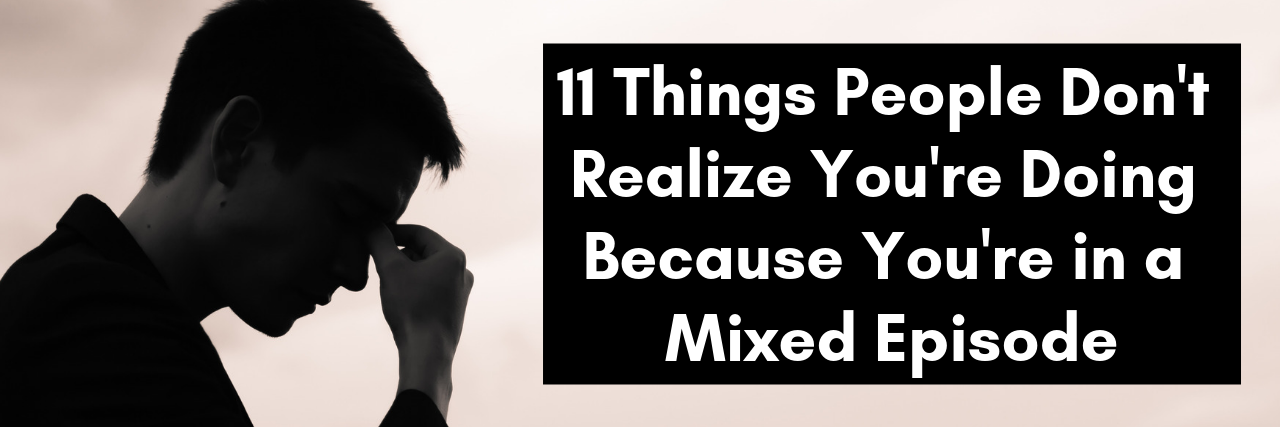11 Things People Don't Realize You're Doing Because You're in a Mixed Episode
Written by Felix Kalvesmaki.
Many people with bipolar disorder experience mixed episodes — a mood episode characterized by the presence of manic and depressive symptoms. They can bring someone from their highest peak of happiness to their lowest points of depression — all in the course of one day.
• What is Bipolar disorder?
Mighty contributor Rebecca Larrondo described her experience in her piece, “What It’s Like in the Midst of a Mixed Episode.”
Normally, I cycle through moods every few days, weeks or months, but very rarely do I go through several mood changes in a day. These aren’t just the slight mood swings we used to get as teenagers. These are drastic shifts in mood. It is exhausting.
If you can relate to her experience, you’re not alone. In order to help more people understand what these episodes can feel like, we asked our bipolar disorder community to describe some things they’ve done in a mixed episode.
Here are 10 things people in our community do that others don’t realize are because they are in a mixed episode:
1. Getting Angry
“Extreme anger — I scream and see red so easily. It doesn’t take much to provoke me either. Most people think it’s me being a raging ‘lunatic’ and not me needing help.” — Allison S.
“Being snappy and unreasonable. Coming across as more angry/irritated than usual, often over small things.” — Sharon S.
2. Talking Too Fast
“Talking over people I perceive are talking too slow or think too slow. Switching topics of conversation like I am TV channel cruising.” — Camilla B.
3. Working Out More
“Working out a whole lot more. Five to six days a week and ramping up my workout a whole extra hour. I become almost obsessed with it, and get irritated if I am unable to do so.” — Jolyn B.
4. Feeling “Empty”
“When I’m having a mixed episode, I say that I feel ‘aggressively empty.’ I have the negativity of depression, with the energy of mania. It might not look like depression on the outside because of my energy, but behind the pressured speech and 3 a.m. cleaning sprees is hopelessness and guilt.” — Kara N.
5. Over-Posting on Social Media
“I’m crying nonstop from the depression and extremely irritable from not sleeping, so I over-post on social media at times or excessively read books to give my brain a somewhat balanced solution. I’m not a writer or bookworm by choice anymore, it’s because I have to be.” — Sami S.
6. Making Plans But Not Following Through
“Make plans! I get so excited to do all the things with people! Go to movies or bonfires, hang out or go out to eat and then, boom! Just like that, I cancel. That’s pretty typical.” — Kassandra K.
7. Isolating
“I’m isolating. My mind is going so fast with angry, suicidal, paranoid thoughts that I can’t stand to be around people because I’m afraid they will ‘figure me out.’ I also can’t stand being in my own skin so I rock back and forth a lot in my bed.” — Mindy M.
“Isolation became my new norm several months ago because I couldn’t trust my cycling feelings and emotions which have me mentally [frozen] and no relief on the horizon. My mind is on constant overload with suicidal ideation, fear of everyone and everything, and persistent unwanted thoughts. It’s not safe to be my genuine self around others unless I’m stable.” — Lisa H.
8. “Joking” About Suicidal Thoughts
“‘Joke’ about suicide while laughing/making plans/keeping extremely busy. People don’t realize I’m actually seriously thinking it.” — Kim A.
9. Being Extra Sensitive to Noise
“Every sound someone will make physically hurts me, when I have a mixed episode. I have yelled at my fiancé for the way he breathes, thank God he is a patient man. Then I would flip a switch and want to be intimate. Afterwards I would feel like the weight of the world is on my shoulders.” — Alyssa H.
10. Making Romantic Choices You Wouldn’t Otherwise
“I’ll enter into a romantic relationship with a close friend, only to realize after the episode that they are completely wrong for me. I always feel so terrible after having to end it.” — Felecia R.
11. Putting Yourself in Dangerous Situations
“Intentionally putting myself in dangerous situations. Like going drinking by myself. Or walking alone at night long distances. Or driving without my seat belt. Anything that puts me in danger.” — Morgan C.
Regardless of your emotional state, it’s important to understand that what you’re feeling is valid. If you’re in that confusing place of trying to balance two extremes, it’s OK to not be in total control of it. It’s a lot to balance at once, and you’re allowed to have a slip-up or two. Communicating this emotion to others, and being kinder to yourself, can make these moments easier to manage.
If you or someone you know needs help, visit our suicide prevention resources page. If you need support right now, call the National Suicide Prevention Lifeline at 1-800-273-8255, the Trevor Project at 1-866-488-7386 or reach the Crisis Text Line by texting “START” to 741741. For more support, check out the following stories.

